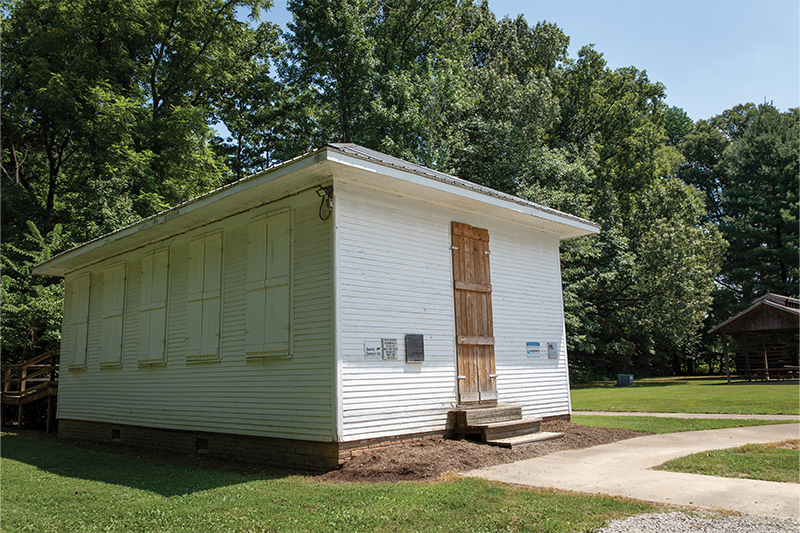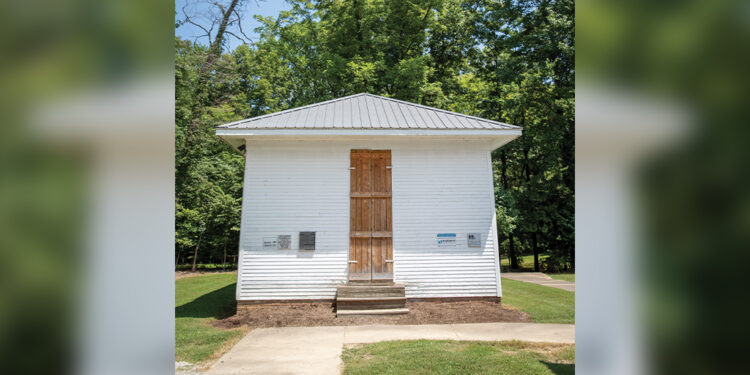Photos by Jamie Alexander
Racism takes many forms. From slavery to segregation to modern-day disparities in healthcare and education, the effects of racism have shaped our nation’s history. But during that history, certain groups have vigorously fought for some semblance of equality for Black Americans. This is a brief history of segregated education in Kentucky, the efforts of those that sought change, and the impact they had on education in our community.
Daviess County is presently home to sixteen schools for elementary-aged students. Many schools have come and gone during the county’s history, and others have been forgotten. But the building that housed one of the area’s oldest schools still stands, tucked away in Yellow Creek Park’s Pioneer Village. While many visitors to the park have seen the structure, few may appreciate its significance.
Kentucky’s Segregated School System
Kentucky elementary and secondary schools were legally segregated until the U.S. Supreme Court’s 1954 decision in Brown v. Board of Education, and even then, complete statewide school desegregation did not occur in Kentucky until after September 1975. Still today, racial inequality persists in our school systems. In addition to other factors, this inequality is largely the product of the mechanism by which schools rely on funding – property taxes.

In 1913, after years of essentially ignoring the education of Black Kentuckians, the Kentucky Board of Education created the State Agent of Negro Schools. In 1924, Mr. L.N. Taylor became the first Director of the Division of Negro Education. In a report to the KEA, Mr. Taylor described the discrimination in schools, and how it was achieved through discrimination in taxing at the time: “Racial discrimination in local school taxation is practiced in many school-taxing districts in Kentucky. Most typical of these is the class of school taxing districts known as graded common school districts. We have somewhat more than two hundred of these units and this discrimination is practiced in most of them. The typical procedure in such cases is for the board of trustees, which is the levying authority, to levy a tax for local school purposes, but to limit that levy to such property within the district as at the date of the levy is owned by white people and by corporations and to exempt from the levy such property as at that date may be owned by colored people. The purpose of this exemption of property owned by colored people is to afford an excuse for denying to the schools attended by colored children of the district any part of the revenue derived from such taxation.” Mr. Taylor went on to note that “Wherever racial discrimination of any of these forms is practiced, its purpose and effect is to discriminate in revenues and school service against the colored children of the district as compared with the white children of the same district. It results in shorter terms, shorter courses, poorer school houses, more meager equipment, poorer teacher service, and deprivation of transportation to school for the colored children of the district. Such are its purposes. Such are its effects.”
Rosenwald Schools
Because the public sector was failing to afford an equal education to Black students, private individuals stepped in to bridge the gap. Most Americans have heard of businessmen and philanthropists like John D. Rockefeller, but far fewer are familiar with the work of Julius Rosenwald, former owner of Sears, Roebuck and Company.
In 1917, in collaboration with Booker T. Washington and the Tuskegee Institute, Julius established the Rosenwald Fund. After reading Washington’s memoir, Up From Slavery, Rosenwald was inspired by his collaborator’s zeal for education, particularly as a tool against oppression. The Fund provided donations to universities, museums, and for the building of YMCAs for Black Americans. But perhaps its most important contribution was the building of 5,388 schools and 217 teacher homes for Black students in the South. One of those schools is the building that still stands at Yellow Creek Park.
In the early fall of 1919, Black students enrolled in grades 1-8 at the Rosenwald School in Pleasant Ridge in southeast Daviess County. More than 1,000 rural county residents graduated, and the school had a profound and positive impact on the education of Black students in our community. The school closed in 1936-37 as students enrolled in consolidated African American schools in Owensboro.
In total, the 5,000-plus rural Southern schoolhouses served more than 700,000 black students over four decades, and Rosenwald Schools comprised more than one in five Black schools operating in the South by 1928. Notable alumni include Congressman and civil rights leader John Lewis and poet-author Maya Angelou.










